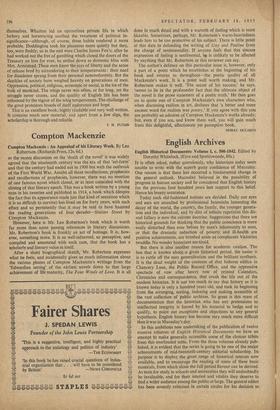IN the recent discussion on the 'death of the novel'
it was widely agreed that the nineteenth century was the era of that 'art-form' and that the century had ended not in 1900 but with the outbreak of the First World War. Amidst all these recollections, prophecies and recollections of prophecies, however, there was no mention of one famous novel which closed, or at least coincided with the closing of that literary epoch. This was a book written by a young man in his twenties and published in 1914, a book which (despite the fact that its appearance made just that kind of sensation which it is so difficult to survive) has lived on for forty years, with such effect and so persistently that it may be said to have haunted the reading generations of four decades—Sinister Street by Compton Mackenzie.
However, here is Mr. Leo Robertson's book which is worth far more than some passing references in literary discussions. Mr. Robertson's book is frankly an act of homage. It is, how- ever, something more. It is so well-informed, so perceptive, and compiled and annotated with such care, that the book has a scholarly and literary value in itself.
After a short biographical sketch, Mr. Robertson expresses what he feels, and incidentally gives us much information about the various phases of Compton Mackenzie's writings from the
'Edwardian setting' of the earliest novels down to that large achievement of his maturity, The Four Winds of Love. It is all done in much detail and with a warmth of feeling which is most likeable. Sometimes, perhaps, Mr. Robertson's warm-heartedness leads him to be too protective of his subject. There is little point at this date in defending the writing of Guy and Pauline from the charge of sentimentality. If anyone feels that this sincere expression of feeling is sentimental, he is unlikely to be affected by anything that Mr. Robertson or this reviewer can say.
The author's defence on this particular issue is, however, only a part of a point which he establishes at the beginning of his book and returns to throughout—the poetic quality of all Mackenzie's work. It is a point well worth making, and Mr. Robertson makes it well. 'The secret of his success,' he says, `seems to lie in the profounder fact that the ultimate object of the novel is the prose statement of a poetic truth.' He then goes on to quote one of Compton Mackenzie's own characters who, when discussing realism in art, declares that 'a better and more ancient word for realism was poetry.' if you agree with this you are probably an admirer of Compton Mackenzie's works already; but, even if you are, and know them well, you will gain much from this delightful, affectionate yet perceptive book.
MORAY MCLAREN










































 Previous page
Previous page